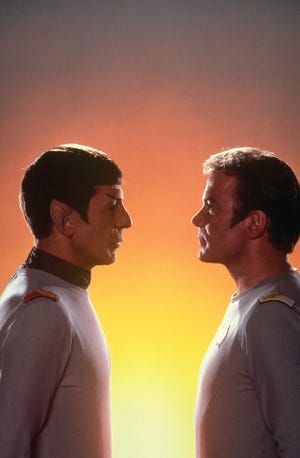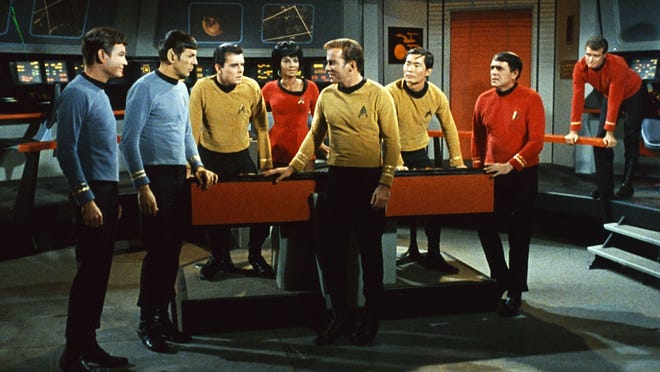Fifty-five years after “Star Trek”aired its first episode on Sept. 8, 1966, the culture-altering sci-fi TV series continues to hurtle through galaxies.
Star Trek Day arrives Wednesday, after Paramount announced a “Star Trek” movie for 2023, the fourth in the new timeline, with “WandaVision” director Matt Shakman and J.J. Abrams producing.
Meanwhile, 90-year-old William Shatner, the seemingly dilithium crystal-charged OG Enterprise captain, is celebrating the release of the first four “Star Trek” movies in 4K, while also speaking out about “Star Trek,” love and loss on his introspective new spoken word album, “Bill” (out Sept. 24), which features musical guests such as Brad Paisley and Joe Jonas.
The cancellation of TV’s “Star Trek” in 1969 was “a low point in my life,” Shatner tells USA TODAY. “It was the last chapter as far as I was concerned at that time. But as life does, sometimes, what is down comes up.”
Shatner discusses the universal upsides that followed and pays tribute to his friend and co-star Leonard Nimoy, who died in 2015.
‘Star Trek: Wrath of Khan’ director pleads:Quit asking if Ricardo Montalban’s chest is fake, it’s all muscle

Question: First, the new “Star Trek” movie. No cast details. Is Prime Kirk making his first appearance in the new movie timeline? It’s time.
William Shatner: I agree with you. We need to see a Prime Kirk 55 years after the fact, and maybe 20 pounds heavier. How would you explain that? That’s their dilemma.
What you’ve just said (about the movie) is news to me and I’m delighted to hear it. But my (studio) connection is frayed. Not afraid. Although I’m a little afraid of being frayed.
Q: On your new album, you discuss watching coverage of the historic 1969 Apollo moon landing one month after the “Star Trek” cancellation. How was that?
Shatner: I had been to Cape Canaveral as Captain Kirk, with the red carpet treatment. I had signed something saying, “See you on the moon.” When our “Star Trek” ratings went up, they appropriated more money for the space program. So I felt a part of this. And there was Neil Armstrong, walking on the moon. This incredible moment for humanity.
And I’m lying on a bed in an RV, looking through a window at the moon, watching this on a little four-inch black-and-white television set on my belly. I’m in a pasture on Long Island doing summer stock theater. I’m at a very low point watching this high point.

Q: “Star Trek: The Motion Picture” came out in 1979. There’s a really long scene – like 10 minutes – of Kirk lovingly inspecting a substantially improved Enterprise. How refreshing were real movie special effects?
Shatner: It was wonderful. The whole newness. We had been canceled and all of a sudden, there was all this money poured into the production. We thought, we’re off and running into the major movie arena. We weren’t. The movie wasn’t the success we hoped it would be.
But the special effects were so primitive in the television show. You look at it now, it’s almost laughable. And we were discovering things as we went along. It’s like the rushes would come in after shooting, and we’d say, “Oh, no! We’re falling the wrong way on the bridge.” Until we found the results, we were fumbling.
Q: Do you ever correct people wearing “Beam me up, Scotty” T-shirts by telling them Kirk actually never said that line?
Shatner: No. I’d like them to believe the fantasy and let them buy the T-shirts, for which I have no financial interest.

Q: A lot of questions on this online. Do you correct the people who believe Kaley Cuoco is your daughter from those Priceline commercials?
Shatner: They plucked a hair from her body and did a DNA test. It didn’t turn out. No, Kaley Cuoco is not my daughter. I’d rather they didn’t believe that because I’ve got three beautiful daughters. But if they want to believe that Kaley Cuoco is related, she’s a beautiful, lovely young lady. I would be delighted to have her as a member of our family.
Q: Once again, the autobiographical album. You speak about Leonard Nimoy dying, missing the funeral, and swallowing your tears. Was it cathartic to write about this in a song?
Shatner: I actually got that out. Leonard was being buried on a Sunday morning, and I had agreed to (attend) a Red Cross charity thing at Mar-a-Lago that year. I had to decide. I decided for the charity. I said to the people at the charity that there’ll be things erected for Leonard – but they’re all ephemeral. Everything dies. Everything turns to dust. The only thing that remains are our good deeds, that’s the legacy.
Q: The song does seem to be a signal to the universe that you still think about your friend.
Shatner: It was that signal, to all life in the universe. Or a signal to buy the album, I guess.
